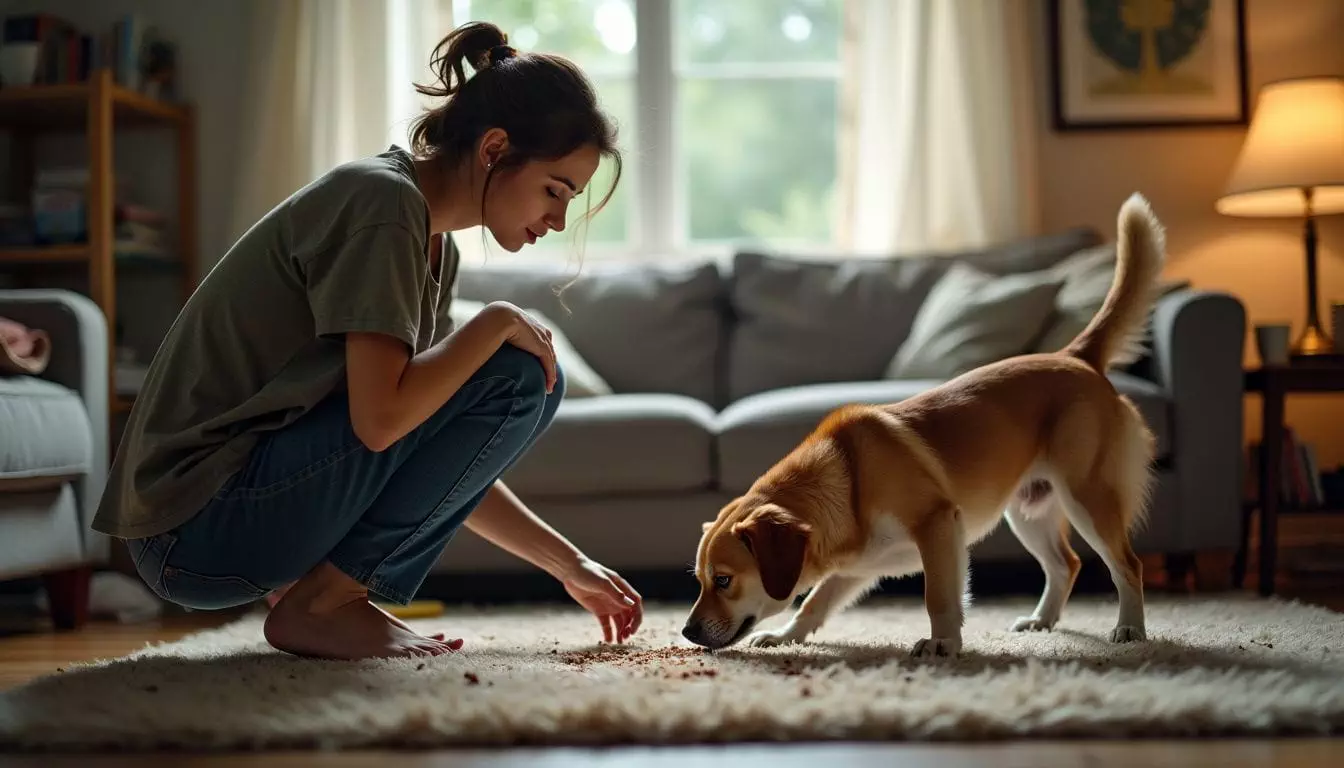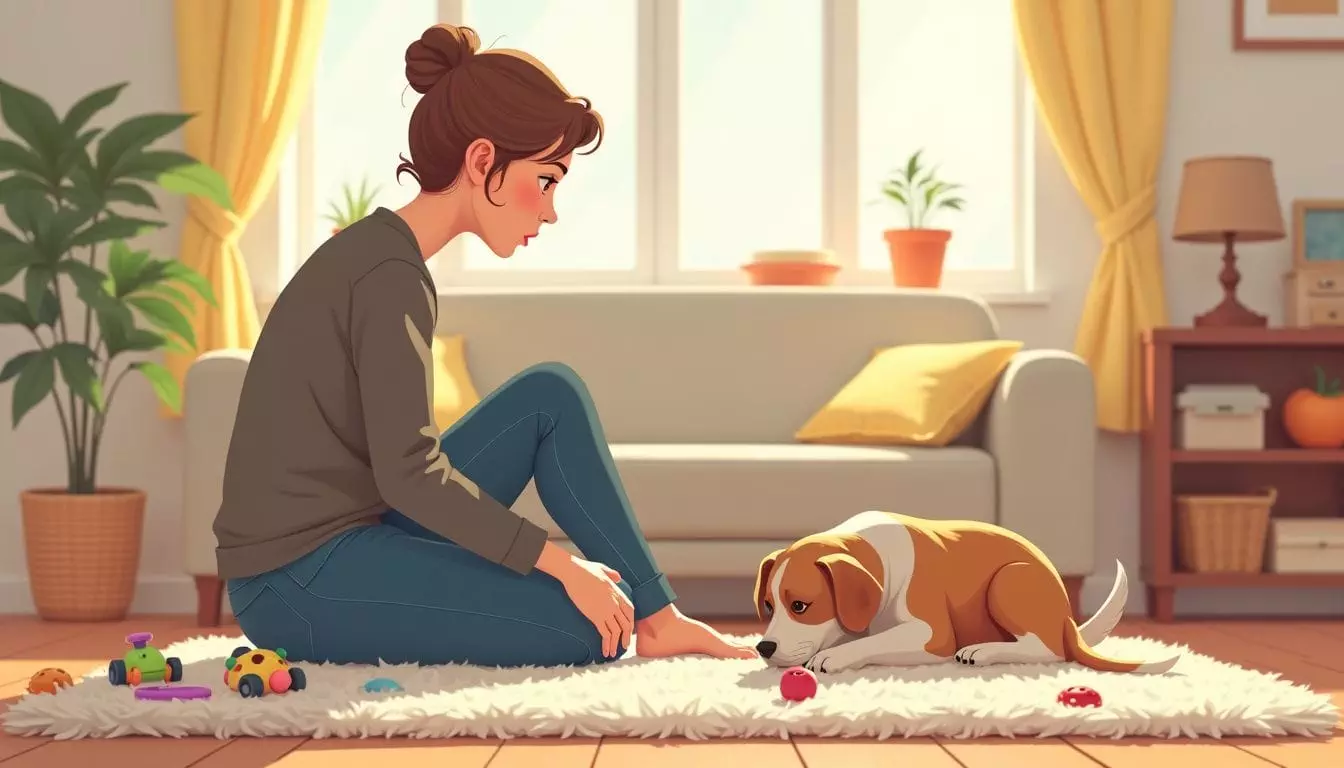Dogs licking carpets can signal health issues. This behavior often stems from nausea or digestive discomfort. 1 Pet owners report increased instances of carpet licking, pointing to a trend in canine gastrointestinal problems.
Veterinarians advise close monitoring of this habit.
Our team of certified veterinarians and dog trainers brings decades of experience to this topic. They’ve seen countless cases of carpet licking and know the underlying causes. 2 This article explores why dogs lick carpets and offers practical solutions. Understanding why dogs lick carpets is essential for addressing this behavior effectively. It can stem from anxiety, boredom, or even medical issues, which makes it important to identify the root cause. By recognizing the signs and implementing tailored strategies, dog owners can help their pets break this habit and foster a healthier environment.
Learn to spot the signs and take action.
Key Takeaways
- Dogs lick carpets due to health issues, stress, or boredom. Common causes include nausea, mouth pain, anxiety, and brain problems.
- Keep track of when and how long your dog licks the carpet. Look for other signs like gulping, pacing, or eating non-food items.
- See a vet if licking doesn’t stop. They can check for health issues and suggest treatments like diet changes or meds.
- Give your dog toys, games, and exercise to stop boredom. Train them with commands like “leave it” to redirect licking.
- Most carpet licking can be fixed with the right care and attention from owners.
Common Reasons for Carpet Licking in Dogs

Dogs lick carpets for many reasons. These range from health issues to stress and boredom.
Nausea or Digestive Discomfort
Dogs often lick carpets due to tummy troubles. Acid reflux can cause this behavior. Dr. Ryan suggests trying Pepcid AC every 12 hours for relief. Nausea might also lead to carpet licking.
Pepto Bismol can help, but watch for signs of bloating. If a dog makes gulping or burping noises, it may signal digestive issues. A bland diet could ease these problems. 1
Carpet licking may point to more serious health concerns. Vets can check for underlying causes like liver issues or Addison’s disease. 2 They might run tests to rule out medical problems.
Quick action helps prevent complications. The next section explores mouth and throat issues that could trigger carpet licking.
Mouth or Throat Issues
Mouth or throat problems can make dogs lick carpets. Dental issues, sore gums, or foreign objects stuck in the throat may cause discomfort. A yellow lab showed signs of this by licking floors, carpets, and lips.
The vet suggested rinsing the dog’s mouth to stop the behavior. Oral pain or irritation often leads to excessive licking as dogs try to soothe themselves. 2 This can include licking nearby surfaces like carpets.
If a dog suddenly starts licking carpets, it’s crucial to check for any visible mouth issues or signs of distress. Hunger or digestive discomfort might also trigger similar behaviors in some cases. 1
Hunger or Polyphagia
Dogs may lick carpets due to hunger or polyphagia. This condition makes dogs feel extra hungry all the time. Some meds can cause this. 2 Older dogs often get hungrier than before.
A dog’s age plays a big role in their appetite.
Polyphagia can make dogs ravenous, leading to unusual behaviors like carpet licking. 3
Polyphagia is not normal. It can make dogs eat weird things. They might chew on carpets or eat non-food items. This can be risky for their health. If you see these signs, talk to a vet right away.
They can find out what’s wrong and help your dog feel better.
Neurological Conditions
Brain issues can make dogs lick carpets a lot. 4 This happens when nerves don’t work right. Dogs might lick for hours without stopping. They can’t control it. Vets look at how the dog moves and acts to spot these problems.
They may do tests to check the brain and nerves. 1 If your dog licks non-stop, see a vet fast. Quick help can make a big difference. Next, let’s look at how to spot if your dog has a licking problem.
Compulsive Disorders
Dogs with compulsive disorders often lick carpets non-stop. This behavior stems from stress or anxiety. Vets link it to changes in brain chemistry. Some breeds face higher risks. German Shepherds and Dobermans top the list. 5
Owners can help their pets. Positive training works well. Giving toys and more exercise helps too. In tough cases, meds might be needed. A 13-year-old dog showed success with this approach.
Another pup stopped licking only when told “no.” Early action is key to fix this issue. 1
Anxiety or Stress
Stress and anxiety often cause dogs to lick carpets. 5 This behavior helps them cope with uneasy feelings. A dog might lick more during thunderstorms or when left alone. Carpet licking releases endorphins, which calm the dog.
Owners can help by creating a safe space for their pet. Using pheromone products like DAP may soothe anxious dogs. Training commands such as “leave it” can redirect the licking. Regular feeding schedules also build trust and reduce stress.
If licking persists, a vet check can rule out health issues. 1
Canine Cognitive Dysfunction
Canine Cognitive Dysfunction affects older dogs. It causes odd behaviors like carpet licking. Dogs with this issue often seem confused. They may lick non-stop and look spaced out. This problem can’t be cured, but it can be managed.
Vets can help with meds and care tips. 6 Mental games and social time can ease symptoms. 6 Next, we’ll look at ways to spot this problem in dogs. 3
Pica or Eating Disorder
Dogs with pica eat non-food items. This disorder can be dangerous. Some pups eat only one thing, like carpet fibers. 2 Others munch on many objects. Pica often stems from stress or boredom.
It may also signal health issues. Owners should watch for vomiting or odd noises from their dog. These signs mean it’s time to see the vet. 1
Next, we’ll look at how to spot carpet licking problems in dogs.
Identifying the Problem
Dogs often show signs that point to the root of their carpet licking. Owners can spot these clues by watching their pet’s habits and actions closely.
Monitoring Frequency and Intensity
Dog owners must track their pet’s carpet licking habits. This helps identify the root cause and severity of the behavior.
- Keep a log: Note when and how long the dog licks the carpet each day.
- Use a timer: Measure licking episodes to gauge intensity.
- Check for patterns: Look for links to meals, walks, or other daily events.
- Count licks: Tally the number of licks per minute during episodes.
- Note body language: Watch for signs of stress or discomfort while licking.
- Track changes: Compare current behavior to past weeks or months.
- Record triggers: List any events that seem to start the licking. 7
- Observe other behaviors: Note if the dog paces, whines, or shows other odd actions.
- Mark location: Map which areas of the carpet the dog licks most often.
- Video record: Capture episodes to show the vet if needed. 8
Careful monitoring helps owners spot trends and decide if vet care is needed. Next, we’ll explore when to seek professional help for this issue.
Observing Associated Behaviors
Dogs often show signs that go with carpet licking. These signs can help owners spot the root cause.
- Gulping and burping: The dog may make these sounds, hinting at stomach issues.
- Air licking: Some dogs lick the air, mainly at night. This could mean mouth pain or stress. 9
- Overexcitement: A dog that gets too excited during play may be anxious or stressed.
- Eating non-food items: This might point to a diet problem or a health issue.
- Pacing or restlessness: These actions often go with carpet licking and suggest worry. 10
- Changes in eating habits: A dog may eat more or less than usual.
- Drooling: Extra drool can mean nausea or mouth pain.
- Pawing at the mouth: This action might show dental issues or mouth discomfort.
Medical Evaluation
A vet check-up can pinpoint the cause of your dog’s carpet licking. They’ll run tests to rule out health issues and suggest the best treatment plan.
When to Consult a Veterinarian
Dog owners should call a vet if carpet licking persists. Constant licking may signal health issues like nausea or digestive problems. Vets can rule out serious conditions and offer proper treatment.
They might suggest diet changes or meds to help. Some vets recommend Pepto Bismol for nausea or Pepcid for stomach issues. 4
Prompt medical care is vital if a dog shows signs of bloat with licking. Online vet advice through platforms like JustAnswer can provide quick guidance. The next step is learning how to manage this behavior at home. 7
Potential Diagnoses
After a vet visit, several diagnoses might explain carpet licking. Gastrointestinal issues often top the list. Studies show a strong link between excessive licking and stomach problems.
Vets may check for acid reflux or other digestive troubles. 4Anxiety disorders and stress can also cause this behavior. The vet will ask about the dog’s history and if the licking stops when interrupted. Other possible causes include neurological conditions or compulsive disorders.
Blood tests, x-rays, or other exams may be needed to pinpoint the exact issue. Each case is unique, so a thorough check-up is key. 1
Managing Carpet Licking
Owners can take steps to stop their dogs from licking carpets. These steps include changing the dog’s diet, giving more toys, and training new habits.
Environmental Enrichment
Dogs need fun stuff to do. Toys, puzzles, and games keep them busy. 4 This stops them from licking carpets too much. Vets say active dogs are happier dogs. Give your pup new things to explore each day.
Hide treats in toys or scatter kibble in the yard. These tricks make meal times more exciting.
Exercise helps too. Take your dog on walks or play fetch. 1 This burns energy and cuts stress. A tired dog is less likely to lick floors. Try different toys like ropes, balls, or chew toys.
Switch them out often to keep things fresh. Your dog will love the variety and forget about the carpet.
Diet and Nutrition Adjustments
Diet changes can help dogs who lick carpets too much. Vets often suggest adding yogurt or cottage cheese to meals. 11 These foods may fix gut problems that cause licking. A bland diet works well too.
This includes boiled meat with rice and low-fat cottage cheese. Feeding small meals 4-6 times a day is best. Some experts say to stop food and water for 12-24 hours first. 1 Then give small amounts of water and bland food.
Many dog owners say these tips worked for their pets. If licking doesn’t stop, see a vet right away. 1Behavioral TrainingBehavioral training helps stop dogs from licking carpets. Owners can teach the “leave it” command to redirect this habit. They should reward their dog when it stops licking on cue. Consistent practice builds this new behavior. 12
Increasing exercise also reduces compulsive licking. A tired dog is less likely to engage in problem behaviors. Owners can provide puzzle toys to keep their dog mentally stimulated.
These toys offer a positive outlet for the dog’s energy and attention. 1
Medications and Therapies
Behavioral training often helps, but some dogs need more. Vets may suggest meds or therapies for carpet licking. These can ease anxiety or fix health issues. 1
Drugs like antibiotics fight infections. Antifungals clear up yeast problems. Steroids reduce swelling. 13 For upset stomachs, Pepcid AC or Zantac can help. Calming treats and Adaptil products soothe stressed pups.
The vet picks the best option for each dog’s needs. 13
Conclusion
Dogs lick carpets for many reasons. It could be a health issue or a behavior problem. Owners should watch their pets closely. A vet check-up can find the cause. With the right care, most dogs can stop this habit.
Discover more about what your furry friend loves to eat by visiting our guide on dogs’ favorite foods. By exploring our guide, you can find out which foods are safe and beneficial for your dog, as well as which ones to avoid. In addition to learning about your dog’s favorite foods, you can also discover effective dog care tips for maintaining a healthy and happy pup. Providing the right nutrition and following effective dog care tips can ensure that your furry friend lives a long and fulfilling life.
FAQs
1. Why does my dog constantly lick the carpet?
Dogs may lick the carpet due to stress, boredom, or health issues. It could be a self-soothing behavior or a sign of tummy troubles. If your pooch won’t stop, it’s best to check with your vet. For example, pomeranians behavior issues may contribute to excessive licking, as they are known for being high-strung and anxious dogs. Additionally, behavioral training and providing mental and physical stimulation through interactive toys and regular exercise can help redirect this behavior. It’s important to address the underlying cause and provide the necessary support to help your dog stop licking the carpet.
2. Is floor licking normal for dogs?
Some floor licking is normal, but obsessive licking needs attention. It might mean your pup is anxious, in pain, or has a nutritional need. Watch for other odd behaviors too.
3. How can I stop my dog from licking the carpet?
To stop carpet licking, give your dog more exercise and mental stimulation. Use positive reinforcement to teach new behaviors. If it’s a health issue, your vet can help with the right treatment.
4. Could carpet licking mean my dog is sick?
Yes, excessive licking could signal health problems. It might mean digestive issues, pain, or even neurological concerns. If your dog seems unwell or the behavior is new, call your vet.
5. Is my dog trying to tell me something by licking the floor?
Your dog might be signaling hunger, thirst, or a need to go outside. They could also be tasting something you can’t see. Pay attention to when and where they lick most.
6. Can anxiety cause a dog to lick obsessively?
Absolutely. Anxiety, especially separation anxiety, can lead to obsessive licking. It’s a way for dogs to cope with stress. Creating a calm environment and addressing the root cause can help.
References
- ^ https://www.justanswer.com/dog-health/g6tzv-dog-woke-profusely-licking-carpet.html
- ^ https://www.dogster.com/dog-behavior/why-does-my-dog-lick-the-carpet
- ^ https://pethelpful.com/dogs/Why-is-My-Dog-Licking-the-Carpet (2020-11-22)
- ^ https://wagwalking.com/condition/excessive-licking (2017-06-15)
- ^ https://www.denverpost.com/2013/08/06/your-dogs-obsessive-licking-illness-or-anxiety/
- ^ https://www.akc.org/expert-advice/advice/why-dogs-lick-furniture/
- ^ https://unionvet.ca/2015/08/31/excessive-licking-of-surfaces-els/ (2015-08-31)
- ^ https://www.sciencedirect.com/science/article/abs/pii/S1558787811001225
- ^ https://dharamsalaanimalrescue.org/strange-dog-behavior-why-is-my-dog-licking-the-floor/ (2021-02-11)
- ^ https://www.facebook.com/doctor.karen.becker/posts/if-your-dog-developed-an-obsession-with-licking-things-from-carpet-floors-and-fu/438132694343154/
- ^ https://www.justanswer.com/dog-health/65o07-year-old-dog-licking-carpet-sounds.html (2012-01-26)
- ^ https://www.petmd.com/dog/general-health/excessive-licking-chewing-and-grooming-dogs (2021-09-27)

